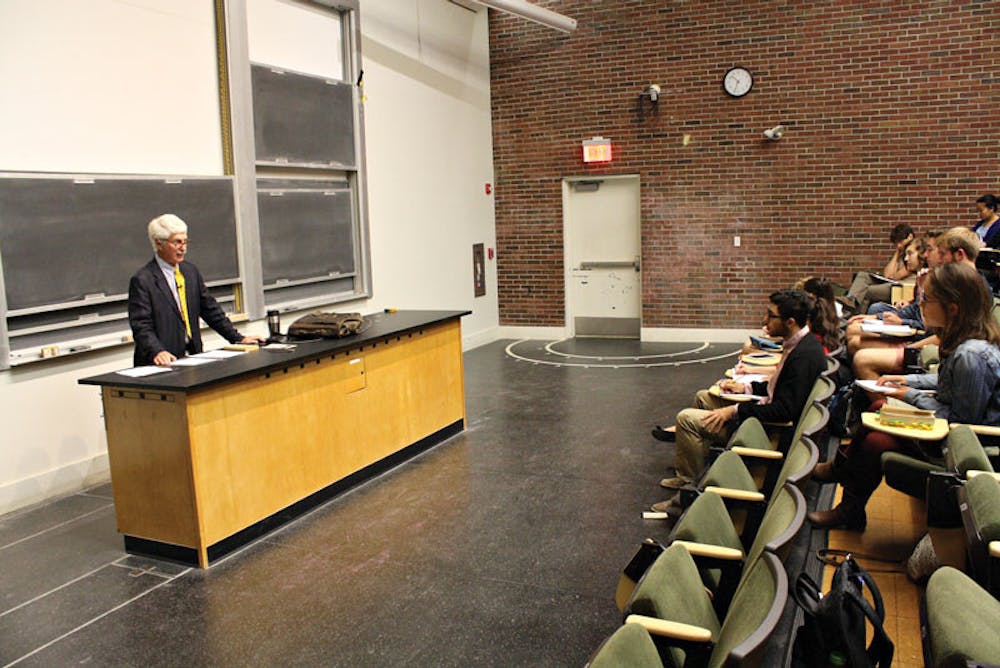The University will offer two massive open online courses through Coursera this semester: “The Fiction of Relationship,” taught by Arnold Weinstein, professor of comparative literature, and “Exploring Neural Data,” taught by Monica Linden and David Sheinberg, lecturer and professor of neuroscience, respectively.
Weinstein’s course was previously offered on Coursera during the summer of 2013, while “Exploring Neural Data” was taught for the first time at Brown in the spring and is making the transition to Coursera for the first time. As of Friday afternoon, enrollment in “Exploring Neural Data,” hovered around 22,800, Linden said, and enrollment in “The Fiction of Relationship” had surpassed 20,000, according to a University press release.
“I was interested in the idea of reaching a lot of people,” Linden said, adding that she believes the class fits well into a contemporary trend in neuroscience, namely a “push for open access to data.” She said she believes that the material covered by the course is very valuable for undergraduate students, regardless of its status as a MOOC.
“We didn’t think too much about numbers when we were designing the curriculum,” Sheinberg said, adding that both he and Linden are aware of the challenge of ensuring that enough support will be available for people working on the class’s problem sets.
“To keep it going, it has to work fluidly,” so support from peers, and proactive participation on the class’s discussion forum will be very important, Sheinberg said.
“People are quite liberated and empowered,” by the online platform, Weinstein said. Though some valuable characteristics of classroom instruction are lost when a course is taught online, students feel more comfortable with offering thoughts and input to class discussions, he said, adding that other fields outside of literature may not benefit the same way. Online, Weinstein does not have a physical presence, which means that he does not “get in the way,” of the free flow of ideas he said.
But Weinstein said he acknowledged that “all of that has a flipside,” and both classroom and online learning have their own virtues and blind spots.
“It was very exciting. … It was very interesting,” Weinstein said of his previous experience teaching “The Fiction of Relationship” as a MOOC, adding that he was pleasantly surprised by how “productive” he found the course. Students were able to engage with literature in a way that was “enormously enriched” by online forums, he added.
The 146 students currently enrolled in COLT 1420T: “The Fiction of Relationship” on campus “are going to be double citizens,” Weinstein said. They will register for the Coursera course simultaneously and write a short, ungraded paper at the end of the semester to reflect on the pros and cons of the course as they perceived them.
“They may say it is a disaster,” Weinstein said, adding that in some ways, it is “a kind of experiment.”
Linden said that one potential benefit of MOOCs having so many students is that there could be more interesting approaches to solving problems. She added that because people who take the MOOCs are not receiving a formal University credit upon completion, they may be more willing to take risks in approaching problem-solving.
Students will face three kinds of assessments in Linden and Sheinberg’s class. There will be quizzes, automatically-graded computer coding assignments and peer-reviewed tasks that will evaluate the students’ abilities to present data “in a way that makes sense,” Linden said.
“We don’t know how much people will put in,” Sheinberg said.
“We’re just hoping that everyone gets what they were hoping to get,” Linden said.
Weinstein said he was skeptical of attempting to gauge what students have gotten out of his MOOC. “I don’t think this will replace the classroom … at least not yet,” he said, adding that he is concerned that online classes — if offered for credit at other institutions — could eventually lower the net number of faculty positions at colleges and universities across the country. “I will not be proud if some people lose their jobs, or if some places close up shop” because of digital education, he said.

ADVERTISEMENT




